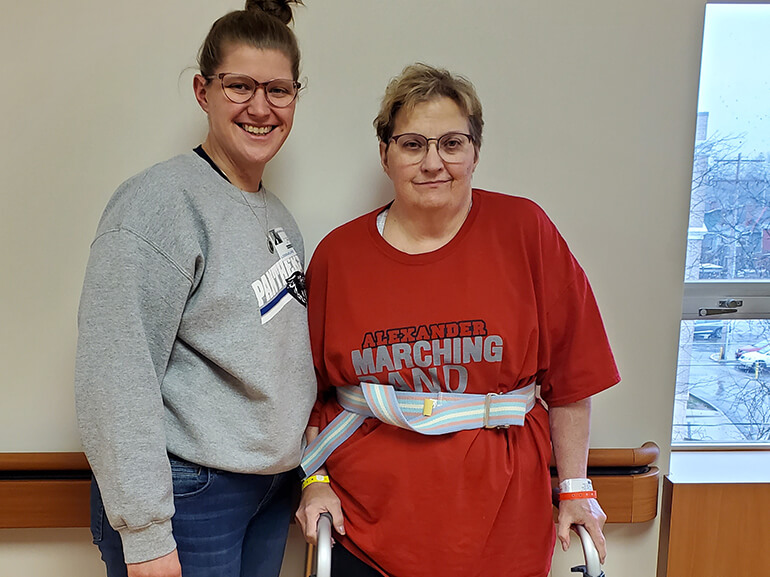Elisabeth Milbaugh's story

Elisabeth (Lisa) Milbaugh, a 61-year-old retired pharmacist, was independent and living alone. She enjoyed reading, crossword puzzles, knitting and watching her son and other family members participate in amateur racing. Then, she developed a brain bleed that turned her world upside down.
Lisa was having a normal day until she was found unresponsive on the couch by her son after suffering a stroke. She does not recall any specific feelings prior to the event. He called an ambulance and paramedics inserted a breathing tube. She was taken to her local hospital and, after about an hour, was sent by helicopter to Riverside Methodist Hospital. After 10 days there, she was stabilized and transferred to OhioHealth Rehabilitation Hospital.
When she arrived at the rehabilitation hospital, Lisa was unable to talk or use her right arm. She needed maximum assistance for bed mobility, moderate assistance for transferring from one surface to another and walking was not attempted due to safety concerns. She didn’t have any specific goal other than to get better.
In occupational therapy, Lisa’s care team performed functional electrical stimulation of her right arm to help her regain function. She also worked on one-handed upper body dressing techniques to gain independence and improve coordination of her right hand.
In physical therapy, Lisa worked on her gait. When she first started, she needed one person to assist. However, she eventually progressed to walking with only supervision using a walker. She also worked on lower body strengthening to help with walking as well as transfer training and standing balance.
In speech therapy, Lisa worked on communication strategies to make her needs known as she was not able to verbalize when she first arrived. Lisa’s speech therapist started with having her make an “s” sound and eventually worked up to saying full sentences. She remembers her first words clearly. “You think my tractor’s sexy. Those were my first words and I never looked back from there,” said Lisa, referencing one of her favorite songs. Lisa also worked with speech therapy on swallowing. She was originally on a pureed diet, but was able to upgrade to a chopped diet following tongue and swallowing exercises.
Her family was a big source of motivation during her stay and will continue to help her after discharge. “My daughter has graciously opened her home to me. She has been there for me for everything,” Lisa said.
By the time she was discharged after about three weeks in the rehabilitation hospital, Lisa had gone from nonverbal to talking and went from not having function on her right side to walking. “I got my speech back,” said Lisa. “I got my function back in my right leg and right arm. I didn’t think I’d get any function back.” Now that she is going home, she is looking forward to eating different foods and continuing to get better every day.
Her advice is simple for others going through a similar rehabilitation journey: “Keep at it.”